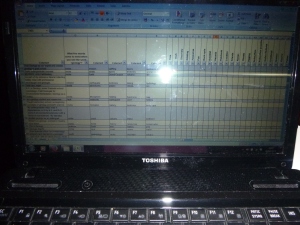Last week I attended a training session on science communication and one of the things we discussed was the value of truly representing what a scientist is and does. Part of this was the idea that the public is never going to be interested in scientists, because they are boring. Now whether we should give up on communicating just because we don’t think people are interested is another matter, but this idea of scientists being boring as off-putting is something that I found quite interesting. Is science boring? And should we only communicate something when it is interesting?

Yes, you can even get a t-shirt featuring our favourite scientist stereotype from Shirtoid
As a PhD student, I am right of the thick of scientific research – ok so mine is a combination of psychology and geology – but still, I go through the daily grind of reading journal articles, collecting or generating data, analysing said data and preparing it for review, be it as a part of a report, article or presentation. In my last data analysis phase I ‘cleaned’ just over 4,500 words for a thematic analysis of people’s first words that they associate with ‘geology’. I thematically coded the data, then quantified the number of occurrences of each word and calculated the dominant trends.
What that means is I started out by going through all the words that were submitted for my survey. I checked them all to make sure that they were spelled correctly and if I couldn’t work out what word they should be, I flagged them for attention later. I took out the incomplete datasets; where people hadn’t answered all the questions (because an incomplete set could change the way my data calculated the statistics) and the ones where the respondent was clearly taking the mickey. I then looked through the words to see if there were any themes; any words that represented the same ideas that could be grouped together, and counted the number of times those themes were mentioned. I then went through and calculated how many times each individual word was mentioned and looked at which were the most common. Then I split up the data by some of the other information I had been given, whether people thought they had experience of geology or not, their gender and what their educational level was and ran those tests again. I then looked at all these results and tried to work out what they were telling me.
And that’s just the data analysis!
Was it boring? Well I can tell you that whilst I was going through it my answer to that question would have been YES. When you have read the word ‘rocks’ for the 2,378th time, you start to wish for a magic wand to do all this data analysis for you. But despite the repetition and unending lists of information, I wouldn’t give up doing the data analysis myself, because what you get with reading it all yourself are the really interesting little sparkles in the data that you didn’t know were there. The seeds of discovery. I don’t even know what the discovery will be yet and I can feel it fizzing away in the back of my mind every time I see a surprising word or trend. Why would someone use a word like ‘strata’ rather than ‘layers’? Are the different ways that people represent time important? Does the fact that volcanoes are mentioned a lot refer to the influence of the media or formal school education? Or something else entirely!?!
It’s exciting. And having to go through the boring bit makes the little flashes of exciting even more thrilling! I suppose the thing is with discovery is that quite often you have to walk for days hacking through the jungle before you spot the swirling cloud of orange monarch butterflies, or look through thousands of pebbles on the beach before you spot the corner of bone that turns out to be a new species of dinosaur.
Discovery is very rarely something you can do without a bit of drudgery and mind-numbing effort and I think this is an important story to tell. Science isn’t all explosions, vaccinations and rules of the universe. Most of it is slow and steady – you have a question you want answered and the answer might take years, or centuries to come, or it might never be found at all. This is why some research might not seem to have a point; if the question is very specific or hard to answer it might look like someone is burying their life in useless information. A lot of people might even say that was a waste of time, but I can think of at least one very good reason that it’s not.
Curiosity.
As a species one of the few characteristics that define us, in my opinion, is curiosity. We are explorers, questioners, challengers, discoverers – we want to know why, how deep, which way, when, with who and she said what?! As children, we are constantly questioning (some children very persistently – how many of us were the ‘why, but why, but why, but why?’ child?!) and we don’t mind if the answer takes a little bit of digging, sometimes literally, to achieve.
In our adult world immediacy becomes everything. Time is money, don’t you know and if a question takes too long to answer it is thought that we won’t wait for the solution. TV shows present scientific concepts as done deals; the climax of what, behind the scenes, may have been years of painstaking work. Newspapers encapsulate discoveries into sound bites. And scientists are just as much as fault as those attempting to tell the stories; many scientists will not disseminate information about their research until it is published in order to keep priority on the discovery. Science communicators look for the most exciting story to tell, to ‘hook’ people in to listening.
When you communicate your research before it is completed, it is called ‘upstreaming’. Upstreaming tells the story of the science method rather than the science facts. It’s the story of how most of the discoveries we value were made – not with a whizz-bang, but with tedium and effort. So yes, my research is sometimes boring. And sometimes it’s exciting and sometimes I have to dance round my office with the joy of what I see being revealed in my data.
Don’t dismiss boring; if you head upstream you might just make a discovery of your own.



Fantastic article. Thanks! I definitely find that there’s a struggle with breaking the ‘boring science’ stereotype. People associate science with that awful chemistry teacher they had in high school, without realizing how interesting the science can be if presented with the excitement it deserves.
LikeLike
Thanks Alan, I find it is especially tricky representing the boring bits of science (i.e. the method) faithfully AND keeping people interested! But you are right – even the slow methdical bits are exciting if portrayed in the right way.
LikeLike
I guess to do research, you need to be able to see the forest, not just the trees. But on the other hand, from the outside looking in, it’s just details and data without any discernible bigger picture. But unless we’re all nuts, there’s got to be something remotely interesting there 🙂
LikeLike
Great article! Wish more people could understand this, but I think it’s part of the culture now-a-days to do stuff that isn’t scientific because of the stereotypes involved with it. People will point at the ‘big bang theory’ and say those scientists epitomize all types of scientists. Some scientists and geologists can be the most friendly, most interesting and exciting people on this planet; it’s a shame a lot of our generation don’t think it’s cool to be a scientist.
LikeLike
Thanks Freddie and I agree; I love the Big Bang Theory, but sometimes it does make me want to throw things at the TV! Scientists are more than just one thing and we need to show this!
LikeLike